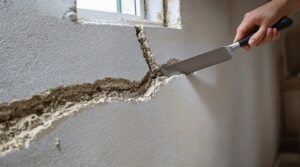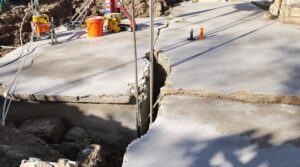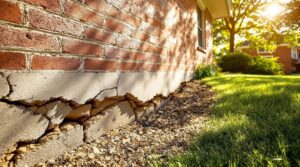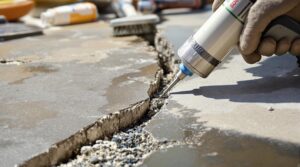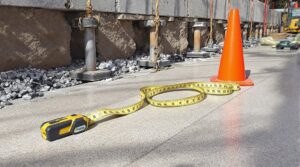Home foundation repairs are a significant aspect of maintaining a safe and secure living environment. Cracks in the foundation, drywall, and sheetrock indicate potential problems. Foundation types include concrete slab, crawl space, full basement, piers and beam, and wood. Average repair costs range from $2,218 to $8,110, according to the foundation type. Specific repair costs also vary widely. Repair methods and associated costs are essential in preventing further deterioration and ensuring the structural integrity of a home – a key aspect explored further.
Key Takeaways
- Signs of foundation issues include cracks in foundation, drywall, and sheetrock, as well as uneven floors and misaligned doors and windows.
- Regular inspections can help identify foundation issues early, reducing repair costs and preventing further damage.
- Foundation repair techniques include polyurethane foam jacking, concrete pressed piling, slabjacking, and piering, depending on the type of foundation and damage.
- The national average cost of home foundation repairs is approximately $5,164, with costs ranging from $2,218 to $8,110.
- Repair costs vary widely based on foundation type, damage extent, soil stability, and geographic location, affecting the choice of materials and methods.
Signs You Need Home Foundation Repair
When a home's foundation is compromised, various signs may become apparent, both inside and outside the structure.
Exterior signs of foundation issues include cracks in the foundation, displaced moldings, and cracked bricks, while interior signs consist of cracks in drywall and sheetrock, uneven floors, and misaligned doors and windows.
A thorough foundation inspection can identify these issues and determine the extent of the damage. Recognizing these signs is essential to establishing a repair timeline, as prompt intervention can prevent further damage and costly repairs. Small horizontal or zigzag cracks in the foundation can be indicative of severe structural issues that require immediate professional attention.
Homeowners who notice these signs should consult a professional to assess the damage and provide a detailed plan for repairs, ensuring the structural integrity of the home is maintained and preventing potential safety hazards.
Regular inspections can also help identify issues early.
Understanding Different Home Foundation Types
Home foundations can be categorized into distinct types, including concrete slab, crawl space, full basement, piers and beam, and wood foundations, each serving a unique purpose and suited to specific climate and soil conditions.
Various materials are employed in the construction of these foundations, such as concrete, concrete blocks, insulated concrete forms, stone, and wood, each possessing distinct advantages and limitations.
Understanding the characteristics and regional considerations of these foundation types and materials is essential for identifying potential issues and selecting effective repair techniques. Ensuring a solid and long-lasting support for the house weight Foundation Support is crucial in preventing structural damage and hazards to occupants.
Types of Home Foundations
Foundations are a vital component of any residential structure, playing a pivotal role in distributing loads and stresses to the ground while ensuring the stability and integrity of the building.
There are several types of home foundations, each with distinct characteristics and advantages.
Basement foundations, for instance, offer additional living space and are resistant to fire and extreme weather, making them ideal for homes in colder regions.
In contrast, slab foundations are less expensive and quicker to construct, resting on the ground with a concrete-embedded beam running along the perimeter.
The slab's durability and low maintenance requirements make it suitable for warmer climates.
Understanding the different types of foundations is essential for selecting the most suitable option for a specific building project.
Regular inspections are necessary to monitor foundation condition and crack size.
Common Foundation Materials Used
A essential factor in the construction of a residential building is the selection of suitable foundation materials, which plays a significant role in determining the overall durability and structural integrity of the foundation. Different materials have distinct advantages and disadvantages, as outlined in the following table:
| Foundation Material | Characteristics |
|---|---|
| Concrete | Strong, durable, resistant to fire and moisture, but can crack if not properly installed |
| Wood | Cost-effective, easy to work with, but susceptible to fire damage, rot, and pest infestations |
| Aggregates | Cost-effective, environmentally friendly, promotes proper drainage, but not suitable for all soil types |
A thorough foundation material comparison is essential for selecting the most suitable material for a specific project. Eco-friendly foundations, such as those using fly ash or aggregates, are becoming increasingly popular due to their reduced environmental impact.
Foundation Repair Techniques Explained
The selection of suitable foundation materials, as discussed previously, is a key factor in determining the overall durability and structural integrity of a residential building's foundation.
Various foundation types, including basement foundations, have distinct characteristics, advantages, and disadvantages. Basement foundations, commonly used in colder climates, offer extra space and energy efficiency but are prone to water damage.
Understanding these foundation types is vital for conducting an effective foundation inspection to identify potential issues and determine the necessary repairs.
The chosen repair technique, such as polyurethane foam jacking or concrete pressed piling, will impact the repair timeline and overall cost.
A thorough analysis of the foundation type and condition is essential for selecting the most suitable repair method and ensuring a successful outcome.
Causes of Home Foundation Damage
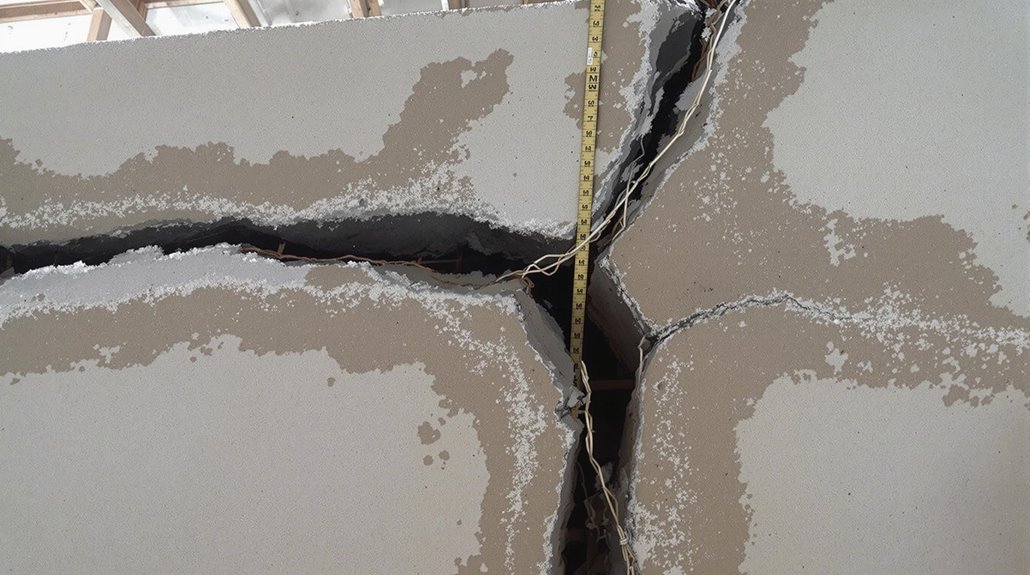
Soil instability is a primary contributor to home foundation damage, and its causes are multifaceted. Water saturation, soil erosion, and shifting soils can all lead to foundation instability.
Poor drainage, often caused by clogged gutters, short downspouts, or poorly graded yards, can also contribute to oversaturated soil. To mitigate these issues, soil stabilization techniques such as chemical grout injection can be employed.
Regular foundation inspection methods, including evaluating soil moisture levels and checking for signs of erosion, can also help identify potential problems. Additionally, construction errors, including improper soil preparation and inadequate waterproofing, can exacerbate soil instability.
Understanding the causes of home foundation damage is essential for developing effective prevention and repair strategies, ultimately reducing the financial impact of foundation issues on homeowners.
Home Foundation Repair Methods and Techniques
Home foundation repair methods and techniques encompass a range of specialized solutions, including slabjacking, piering, and concrete pressed pilings, each designed to address distinct foundation problems.
The selection of a suitable repair method depends on various factors, such as the type and extent of damage, soil conditions, and the type of foundation.
Effective foundation repair requires a thorough evaluation of these factors to guarantee the chosen method provides long-term stability and prevents future damage.
Types of Foundation Repairs
Utilizing various techniques tailored to the specific foundation type and damage, foundation repair specialists employ an array of methods to restore stability and prevent further damage to a structure.
Foundation repair innovations have led to the development of specialized techniques, including deep foundation repairs such as concrete pressed pilings, steel piers, and helical piers.
Shallow foundation repairs, including slab jacking, polyurethane foam injection, and mud jacking, are also employed.
Additionally, specialized foundation repairs, such as basement stabilization and wall repair, address specific issues.
Advanced techniques, like EcSS 3000 and load testing, guarantee long-term stability.
While some DIY foundation techniques are available, complex repairs often require professional expertise to ascertain safety and efficacy.
A thorough assessment determines the most suitable repair method for each unique situation.
Choosing Repair Methods
Foundation repair specialists must assess the specific characteristics of a structure's foundation and the underlying soil conditions to select an appropriate repair method.
A repair method comparison is vital in determining the most effective technique for a particular foundation type. For instance, helical piers are suitable for homes with lighter structures and specific soil conditions, while steel piers are ideal for more severe foundation damage and heavy structures.
Soil condition analysis is also fundamental in determining the depth of pier installation. Scientifically tested solutions like EcSS 3000 can permanently alter soil molecules for long-term stability.
Factors Affecting Repairs
When evaluating the structural integrity of a building, several key factors must be considered to determine the most effective repair approach, as the specific characteristics of the foundation and underlying soil conditions play an essential role in selecting a suitable repair method. The foundation type, soil stability, and extent of damage all impact the choice of repair method and its effectiveness.
| Factor | Impact on Repair Method |
|---|---|
| Foundation Type | Affects the choice of repair method and materials |
| Soil Stability | Determines the depth and type of piers or pilings needed |
| Extent of Damage | Influences the scope and cost of repairs |
Considering these factors is vital to guarantee foundation repair longevity and repair method effectiveness, ultimately leading to a stable and secure structure.
Foundation Repair Cost Factors
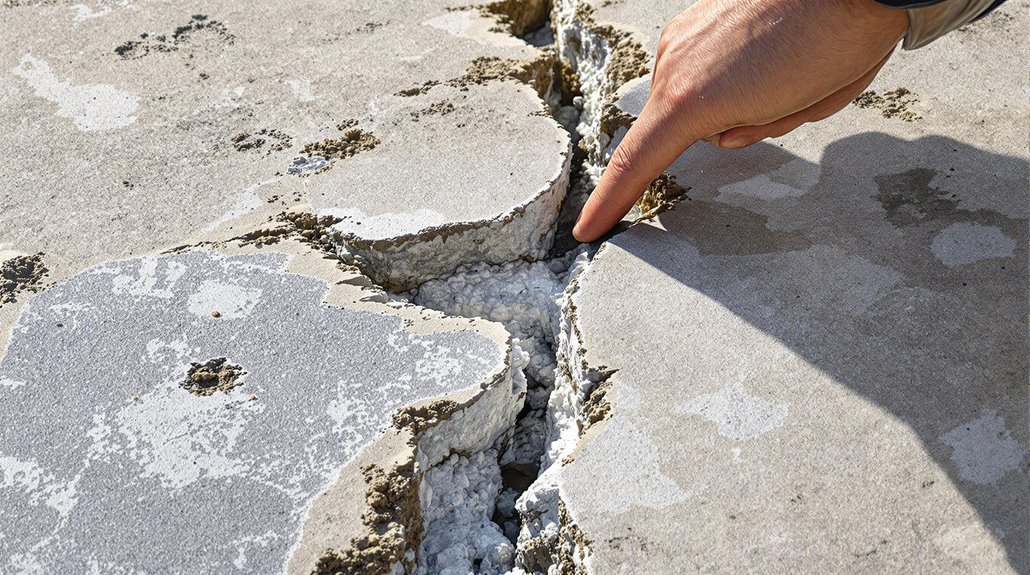
Numerous factors contribute to the overall cost of foundation repairs, making each project uniquely challenging to estimate.
A thorough repair cost analysis requires a meticulous damage assessment to determine the extent of the damage, foundation type and size, accessibility, and site conditions.
The severity of foundation damage plays a significant role in determining the cost, with minor issues being less expensive to repair than major structural problems.
Foundation type and size also impact the complexity of the repair process, with larger foundations requiring more resources and time.
Accessibility and site conditions, such as soil conditions and local building codes, can complicate repairs and increase costs.
A detailed evaluation of these factors is essential for an accurate repair cost analysis.
Average Cost of Home Foundation Repairs
According to current data, the national average cost of home foundation repairs is approximately $5,164, with a range of $2,218 to $8,110.
Average costs, however, can vary greatly depending on the type of foundation being repaired, such as a basement, which may range from $2,300 to $7,600, or a concrete slab, which can range from $350 to $20,000.
Examining the relationship between foundation type and average repair costs can provide valuable insights into the financial implications of foundation damage and the importance of timely repairs.
National Average Repair Costs
The cost of home foundation repairs in the United States varies widely, spanning an average range of $2,218 to $8,110, with a national average of $5,164.
Geographic location greatly influences repair costs, as seen in the varying costs across major cities: New York ($1,700 – $5,500), Los Angeles ($3,200 – $9,200), Miami ($4,500 – $9,100), Denver ($3,500 – $14,000), and Houston ($3,300 – $6,800).
Analyzing foundation repair trends reveals that damage severity and foundation size are key factors in determining costs.
Repair cost comparisons illustrate the importance of considering local regulations, permits, and soil types when evaluating repair estimates.
A thorough understanding of these factors is essential for homeowners to navigate the complex process of foundation repairs and make informed decisions.
Cost by Foundation Type
Foundation repair costs can vary considerably depending on the type of foundation a home has. Different foundation types require distinct repair methods and cost estimation strategies. Understanding foundation repair trends and these differences is essential for accurate cost estimation.
| Foundation Type | Average Repair Cost | Cost Factors |
|---|---|---|
| Concrete Slab | $1,000 to $10,000 | Damage severity, slab size, and pier number |
| Crawlspace | $2,500 to $8,000 | Mold removal, dry rot, and insulation |
| Basement | $2,300 to $7,600 | Size, damage extent, and material type |
Each foundation type presents unique challenges. Analyzing cost factors, repair methods, and trends helps homeowners and contractors develop effective cost estimation strategies and execute successful repairs. Detailed knowledge of the specific foundation type enables accurate budgeting and guarantees the longevity of the repair.
Material Costs for Foundation Repair
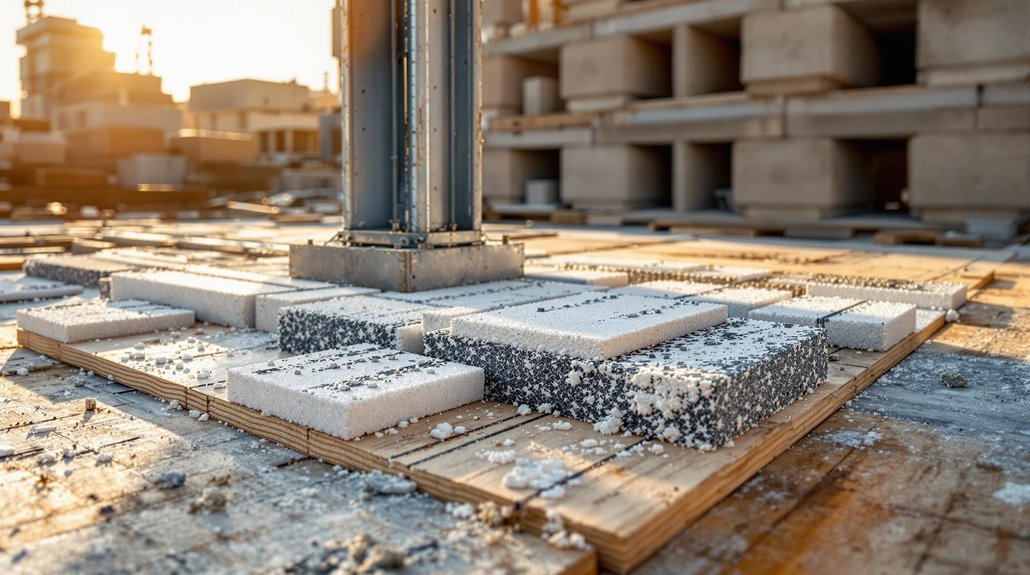
Because foundation repairs can be complex and varied, material costs for these projects span a wide range, depending on the repair method and the extent of the damage. Additionally, understanding the different foundation gap types and causes is crucial in determining the appropriate repair solution. For instance, some gaps may arise from settling soil, while others could be the result of water damage or poor drainage systems. Each scenario requires a tailored approach, influencing both labor and material costs significantly.
A critical factor in determining material costs is material selection, as different materials have distinct price points. For instance, concrete costs can range from $350 to $15,000, while epoxy pricing ranges from $250 to $800 per crack.
Steel repair costs can range from $950 to $19,200, depending on the number of piers needed. A cost comparison of various materials reveals that specialized materials, such as helical piers and carbon fiber strips, can greatly increase the overall repair cost due to their higher price points.
Effective material selection requires considering factors such as durability, performance, and cost.
Breakdown of Home Foundation Repair Costs by Type
Home foundation repair costs vary considerably depending on the type of foundation. A foundation inspection by repair professionals can help determine the necessary repairs and associated costs.
Basement foundation repairs average $2,300-$7,600, with minor crack repairs costing a few hundred dollars and waterproofing ranging from $2,000 to $7,000.
Concrete slab foundation repairs average $350-$20,000, with mud jacking costing $600-$1,600 and piering ranging from $700 to $25,000.
Cinder block and brick foundation repairs average $350-$25,000, with epoxy/polyurethane filler costing $250-$4,000 for crack repairs.
Pier and beam foundation repairs average $750-$25,000, with underpinning costing $1,000-$3,000 per pier and mud jacking/foam jacking ranging from $700 to $25,000.
Regional Foundation Repair Costs Across the US
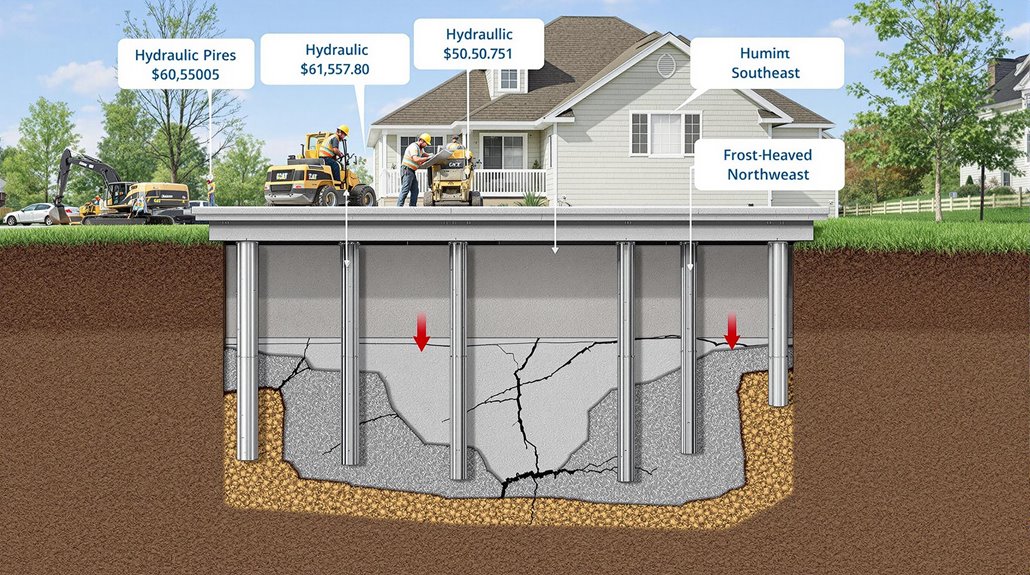
How noteworthy a role does location play in determining the cost of foundation repairs? Regional variations and climate impact are key factors in the cost of foundation repairs across the US. The average cost range for foundation repairs is $2,218 to $8,110, but costs can vary greatly depending on the region.
- * Labor and material costs are higher in urban areas and regions with a high cost of living.
- * Climate conditions, such as freeze cycles and high humidity, can increase costs.
- * Soil stability affects costs, with regions having unstable soil types requiring more extensive repairs.
- * Local building codes and permit requirements also impact costs.
Costs can range from $1,700 to $5,500 in New York and $3,200 to $9,200 in Los Angeles, highlighting the noteworthy regional variations in foundation repair costs.
Preventing Future Home Foundation Damage and Repairs
While the cost of foundation repairs can be substantial, investing in preventative measures can greatly reduce the likelihood of future damage. Implementing foundation monitoring and preventative measures can help mitigate potential issues. The following table highlights key preventative measures to evaluate:
| Preventative Measure | Description |
|---|---|
| Proper Soil Preparation | Analyze soil bearing capacity and adjust construction plans accordingly |
| Direct Water Away | Ascertain gutters and downspouts direct water at least 5 to 10 feet away from the foundation |
| Plant Trees Safely | Choose non-invasive root systems and plant trees at a safe distance from the house |
| Regular Inspections | Perform regular foundation inspections to catch problems early |
| Maintain Consistent Moisture | Keep consistent moisture levels around the foundation to prevent soil contraction and expansion |
Frequently Asked Questions
Is Home Foundation Repair Covered by Standard Homeowners Insurance Policies?
Standard homeowners insurance policies typically cover foundation damage resulting from sudden and accidental events, allowing homeowners to file insurance claims for damages under the dwelling coverage portion of their policy, up to policy limits.
Can I Stay in My Home During Foundation Repair Work?
A monumental task, akin to rebuilding a skyscraper on shaky ground, yet foundation repair can often be done with the homeowner present, as safety precautions are taken and temporary accommodations are rarely needed.
How Long Does a Typical Home Foundation Repair Project Take?
A typical home foundation repair project's duration varies widely, with timeframes for repairs ranging from a few hours to several weeks, depending on factors affecting duration, including damage severity, repair complexity, and environmental conditions.
Do Home Foundation Repair Contractors Offer Financing Options or Payment Plans?
Home foundation repair contractors often provide financing options and payment plans, including partnerships with third-party lenders, to help homeowners manage the costs of repairs, offering flexibility and affordability in addressing foundation issues.
Are Home Foundation Repairs Tax Deductible as a Home Improvement Expense?
Home foundation repairs are tax deductible as a home improvement expense only when constituting a capital improvement, such as a major renovation, which increases the property's value. Otherwise, ordinary repairs are not eligible for tax deductions.


